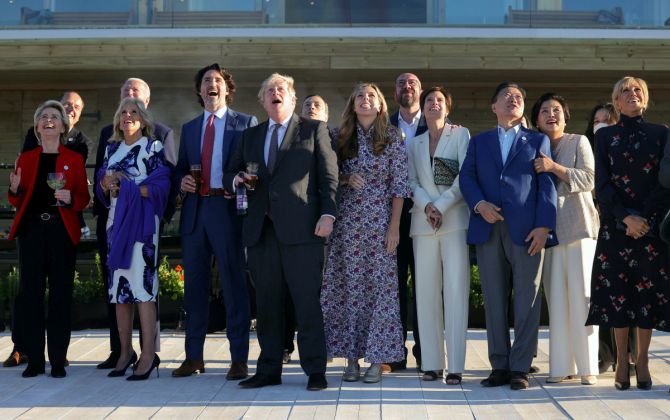Joe Biden's B3W proposal aims to bring democracies together.
India should come up with its own plans to contribute to the initiative, states Rahul Mishra.

During the G-7 Summit held on June 11-13 at Carbis Bay in Cornwell, the United Kingdom, US President Joe Biden proposed a brand-new infrastructure initiative termed the 'Build Back Better World' global infrastructure initiative, or the B3W initiative.
According to a White House press release (extrenal link), 'As a lead partner in B3W, the United States will seek to mobilize the full potential of our development finance tools, including the Development Finance Corporation, USAID, EXIM, the Millennium Challenge Corporation, and the US Trade and Development Agency, and complementary bodies such as the Transaction Advisory Fund.'
The initiative, which has in-principle support of all the G7 member countries (Britain, Canada, France, Germany, Italy, Japan, and the US) is already lauded as an alternative to China's Belt and Road Initiative.
The 2021 G7 Summit also had four guest nations -- India, Australia, South Korea, and South Africa -- in attendance, which are not only democracies but responsible stakeholders in the international system as well.
It is interesting to note that countries like Sri Lanka have already expressed interest in the B3W. According to reports, Sri Lanka's Opposition parties have voiced support for B3W as an alternative to China's BRI. The enthusiastic response to the B3W is hardly surprising considering the mixed (and largely negative) responses from countries across the world to the latter.
Ever since its launch in 2013, China's ambitious BRI, then known as the One Belt, One Road (OBOR) infrastructure initiative, has faced several grave concerns with regard to investment and policy flaws and implementation shortfalls in host countries.
Among others, these concerns include lack of transparency in investments; debt trap; inability to generate local employment; complete disregard for sovereignty and territorial integrity concerns of other countries; interference in domestic politics to extract desired gains; and, overlooking environmental sensitivities, etc.
In response to the BRI, several major international stakeholders have come up with their own initiatives. Interestingly, all these initiatives underscore the importance of transparency, sustainability, abiding international laws and norms, appreciating democratic values, and most importantly, preserving and protecting a rules-based order.
Some notable infrastructure, connectivity, and regional cooperation initiatives include: Partnership for Quality Infrastructure (Japan); Asia Africa Growth Corridor (Japan and India); Blue Dot Network (USA); Project Mausam (India); Security and Growth for All in the Region - SAGAR (India); Indo-Pacific Oceans Initiative (India), etc.
The B3W proposal aims to bring democracies together to pool resources and provide support to the developing countries in building soft and hard infrastructure.
India has taken a positive yet unrushed stand as the ministry of external affairs's official response is that New Delhi would 'study' the proposal first and engage with it at a 'later stage'. India's stand is driven by two important calculations.
First, India is mindful of the fact that bringing together democracies on the connectivity and infrastructure fronts would not be immediately possible. It will take some time before the B3W plan takes concrete shape on the ground. This makes sense if differing perceptions on connectivity and diverse priorities of these advanced countries are factored in. The pandemic has also affected all these countries, albeit in varying degrees.
Moreover, in democratic countries, rather than directly getting involved in BRI-like investments, governments try to encourage the private sector to take the initiative while sticking to its role as a facilitator and enabler. This is in complete contrast with the Chinese-style business and investment practices where such decisions are steered by the government.
State-owned enterprises and even private companies abide by the government policy decisions and designed frameworks.
In case of the B3W initiative, too, the focus within the US is likely to be more on involving the corporate sector. The government-corporate partnership cutting across democracies demands a carefully drafted comprehensive plan -- a road map based on jointly conducted feasibility studies. Here, the best practices of the G7 countries, particularly the US, might be helpful.
Second, India and its partners have taken a number of multilateral and mini-lateral initiatives that are accruing positive results, albeit gradually. Coordination among the seven major economies of the world with diverse interests and other democracies such as India, Australia, South Korea, and South Africa, demands both time and concerted effort. The initiative, therefore, must be taken by the US and other members of the G7.
Having said that, it is clear that if the G7 countries stick to their plans and devise a connectivity strategy, it would be truly global in nature. After all, G7 countries account for around two-third of the global net wealth and 40 percent of global GDP. In addition to the US, countries such as Japan, France, and Germany have considerable economic clout.
The B3W idea of mobilising private sector capital might take time, but it is certainly worth it. Arguably, the idea may also be linked with the United Nations Sustainable Development Goals. Issues such as climate change, digital technology, gender equity and equality, health and health security, and making the more connected and integrated are at the core of the United Nations Sustainable Development Goals.
Some of these issues are also close to the corporate social responsibility agenda of the multinational private corporations such as Microsoft, Sony, Disney etc.
India should also come up with its own plans to contribute to the B3W initiative. It is time India's big corporate houses pull up their socks and make meaningful and substantive contributions in helping the government ensure digital, educational, and health connectivity.
The pandemic has made these issues all the more relevant and important.
Rahul Mishra is a senior lecturer at the Asia-Europe Institute, University of Malaya, Malaysia. He is also associated with the University's Centre for ASEAN Regionalism.
His latest publications include Asia and Europe in the 21st Century New Anxieties, New Opportunities (Routledge, 2021) and India's Eastward Engagement from Antiquity to Act East Policy (SAGE, 2019).
He tweets @rahulmishr_











 © 2025
© 2025